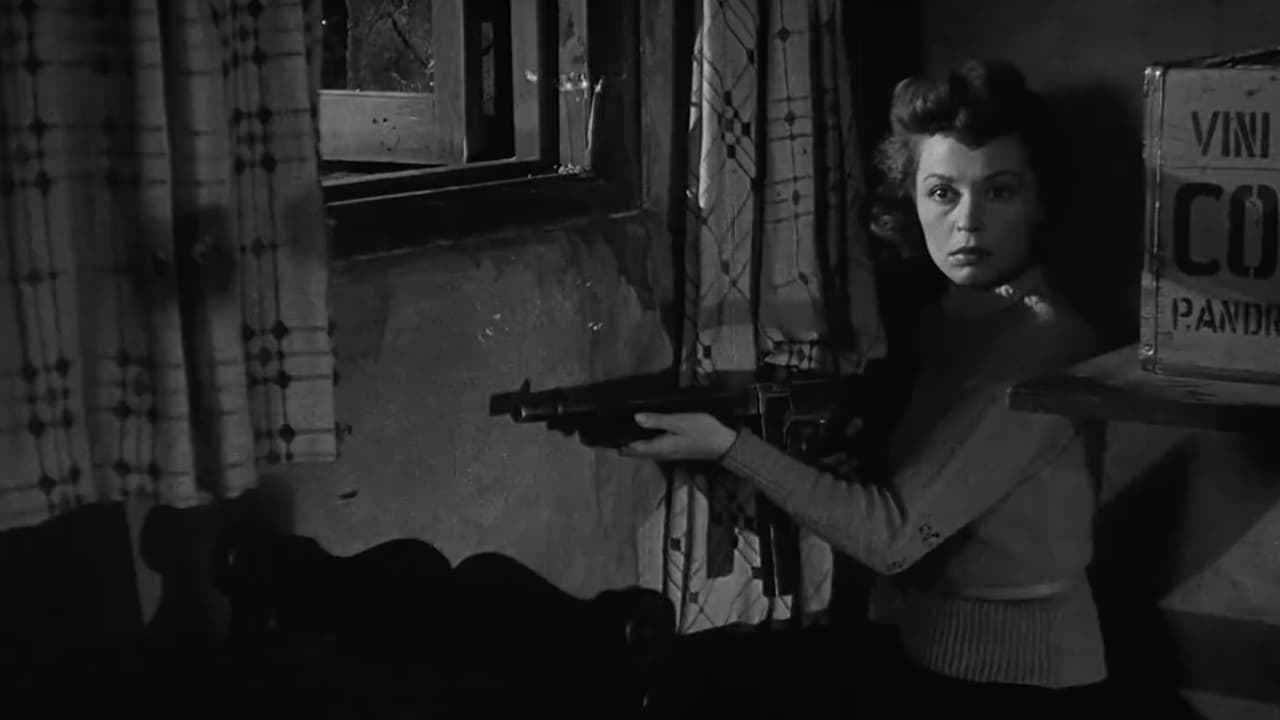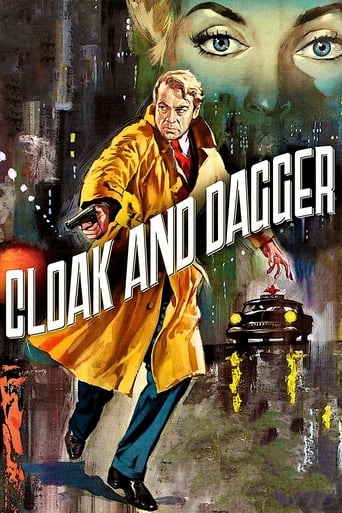

Fritz Lang handles the direction competently and the story is as fascinating as it is confusing. Cooper is a mild-mannered physicist swept up by the OSS and sent to Switzerland to interview a Nazi refugee and find out how far the Nazis and Italians (they're in cahoots) have gotten on the atom bomb. His physicist colleague is a sweet and exhausted old lady, eager to cooperate, but she's kidnapped from the hospital because the Gestapo know what's going on.Thereafter, the intrigue builds. The narrative becomes murky, like my chili bean soup. But that problem can be overcome by paying attention. The real problem is with some of the performances. I hate to say it, because it sounds incredible, but Gary Cooper overacts. His eyebrows go up and down like twin elevators. And -- well, I'll give one scene as an example.On his first day in Switzerland, Cooper finds himself waiting in the hotel bar for a phone call and he begins schmoozing with an attractive fellow American, Marjorie Hoshelle. He discovers later that she's working for the Gestapo. With no adumbration he shows up at her apartment and displays fake evidence that she's been framed into looking like an American spy. No explanation is provided of how all this phony evidence was fabricated.But that's a weakness in the writing, not the performance. Upon finding out that her amiable American cover has been blown, Hoshelle turns into a virtual caricature of a Nazi. She stands with her feet apart, her hands on her hips, her head thrown back, and with a sneer she heaps her anger and contempt on him. It's too bad she lacks a German accent. It would have sounded so good if she'd said, "In dzah end, it is VEE who vill vin dhiz vor!" Lang had some good noirs coming up, but he was asleep at the switch in scenes like this.Still, his staging and lighting are fine. That includes the fist fight which, at one point, Cooper seems in danger of losing. He has to wallop the guy over the head with a mounted stag head, and his opponent is much older and shorter than Cooper. Usually it's the bad guy who is the first to pick up the furniture or a poker or a stuffed head in a fight. But then these Gestapo types are like wild beasts.His elderly opponent is a demon of energy. And when his matronly wife twigs to what's going on, she grabs up a pistol, rushes into the room of the kidnapped old lady who's a righteous physicist, and shoots her four times before exiting through the window. Caught by the OSS agents outside, the old guy's wife snarls, kicks, scratches, and curses like a grizzly bear. A later fight is even more brutal. It must be said that Cooper is suave and canny, physically adept, and handy with a .45 for a simple college professor who's had no training in espionage and who probably hasn't held anything but a beebee gun since childhood.There's another hole in the plot. Cooper lands on the Italian coast with a buddy who calls him "Al". The buddy is played by Robert Alda, who speak passable Italian. But we've never been properly introduced. In fact, we have no idea who he is. We must figure out his part in the story with no help from the script. Then Lili Palmer appears. She needs no introduction. What a beauty. Cooper seeks out another possible Italian collaborator -- Vladimir Nikolayevich Sokoloff, who was born in Moscow and followed the same path as Vladimir Nabokov in his retreat from Naziism: Russia to Berlin to Paris to America. Here, he speaks Italian, German, and English -- all with a Russian accent. But what the hell. To Hollywood he was a "foreigner". The scenes of the landing, by the way, are studio-bound but convincing -- the rocky shore line, the rain storm, the wavelets lapping at the tiny strand. It's after the landing that we see more of the dagger as well as the cloak.The romance that develops inevitably between Cooper and Palmer is actually well done. Usually these amours only interfere with the plot, drummed up to please part of the audience. But this one is handled well by both actors. Palmer is at first brusque but it's not until later that she pathetically reveals the extent to which she's tortured herself for having slept with "fat Gestapo pigs". It's a strangely moving scene.I won't give away the ending but she stands, glowing with hope for the future, and waving at the departing Bristol Blenheim that is whisking some passengers off to safety.
... View MoreThis WW2 espionage yarn gets off to a slow start but picks up steam after the action shifts to Italy and Palmer enters the picture as Cooper's love interest. Cooper acts with his usual awkwardness but in this case his uneasiness is well suited to the role of a scientist out of his element. As an Italian resistance fighter, Palmer gives a wonderfully natural performance. Although the opening credits oddly indicate that this is her film debut, she had been acting for a decade. The best parts of the film are her scenes with Cooper. The fight scene between Cooper and Lawrence is reminiscent of Hitchcock. Lang made this at the time when he was at the peak of his creative powers.
... View MoreCloak and Dagger (1946)More Than a Nazi Spy Film, and Less, TooThere are terrific aspects to this movie, but it's easy to get a bit bogged down at the start, and to flag here and there for the whole first half. Once it hits Italy, and a bit of a formula plot, it picks up steam, including a slightly steamy romance and a predictably dramatic end. It is a deliberate "propaganda" film, really, and it states outright that it is a tribute to the OSS, a 1940s foreign secret service that preceded the CIA. But don't let that bother you...it's not an important element in the drama. What is most striking, politically, is its prescient stance on the bomb. One ongoing problem for me is Gary Cooper, who plays an unlikely American physicist asked to do a highly dangerous undercover job in Switzerland, and then behind enemy lines. Cooper can be strong and calm and silent, and he pulls off the non-GI American with humility and poise. But he also comes off wooden, or worse. Cooper has often had the ability to take powerful lines, or whole dramatic moments, and make them unconvincing or almost destructive by what looks like lack of ability to act. If he is too famous and beloved by to too many people to say he can't act, I still think a red flag is needed here. If Cooper is an acquired taste at best, this isn't Cooper at his best. And he dominates the movie.Outdoing Cooper is the little known Lili Palmer, who had an important role in her next film, Body and Soul. Even though her lines (and her character) are all clichés of sorts, she adds little quirks and dramatic edges that make them work. She's not meant to be an Ingrid Bergman, but more like an Ida Lupino--a woman who can shoot and run, and yet remain a woman. A woman in a man's world. The supporting cast around these two leads isn't bad, not at all, but everyone top to bottom is trapped by a mediocre script, whatever the good intentions.Lang of course is a veteran director who understands dramatic film-making, as well as Europe itself, and in this anti-Nazi film we feel perhaps a tug from his own anti-Nazi past (fleeing Germany in the 1930s and leaving his Nazi-sympathizing wife behind). Politically, there is a strong, even brave, anti-atomic age theme to the movie, including an early impassioned speech by Cooper against the use of atomic weapons. This is just one year after the bombs were dropped on Japan, and the world was still trying to figure out what the atom bomb really meant. Very interesting, clear politics here, and yet it's ostensibly a patriotic film. Overall Lang makes the movie look and sound good, with the help of great cinematographer Sol Polito (Now Voyager, Arsenic and Old Lace) and music by Max Steiner.Another theme which can't be overlooked is a more social one--the romance is really a reason to remind us of the roles women and men are "supposed" to have. War is war, and and in 1946, women and men can go back to what they had been doing before--including getting married and having kids (the scene in the old carousel is a suggestive example here). This underscores the bond and the conflict of Cooper and Palmer, a pair of ordinary people sucked into the high drama of war but wanting only a peaceful world where they could do ordinary things like fall in love without fear.There is actually a lot going on here. Watch for its strengths, and keep your expectations in line.
... View MoreWhile this is probably the first Fritz Lang film I wasn't overwhelmingly impressed with (well, maybe Siegfried, too), it does have a couple of things that make it really worth watching. Cooper's fury as a scientist early on in the movie railing against the amount of money the government pays for the development of killing machines, as opposed to curing diseases and making the world a better place, is beautiful and gave me chills. It's an incredibly powerful expression of grief and outrage in the wake of the bombings of Hiroshima and Nagasaki (this movie came out only a year after the end of the war). Also, there's an INCREDIBLE fight scene late in the movie, in which Cooper's character (who's really a professor, and just an ordinary man, not a hardened fighter) struggles with an Italian spy. I don't think Lang is known for his fight scenes, but this one is a masterpiece. There's no Jackie Chan flying over tables, swinging on chandeliers, or kicking people through walls; instead, you have an ordinary man struggling with a somewhat superior opponent, in a very realistic, very brutal fight scene. A lot of small, practical self-defense moves I remember my dad teaching me when I was young are employed in this fight, including stomping on someone's instep and a couple of simple arm grapples. The action is extremely believable and practical, and the combat is savage, between two men fighting desperately for their lives. No one watches Fritz Lang movies for the fight scenes, but this one's really one of the highlights of this otherwise "eh" film--it's extremely well-done, and very surprising for a 1940s movie.
... View More